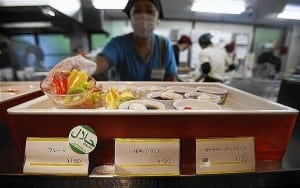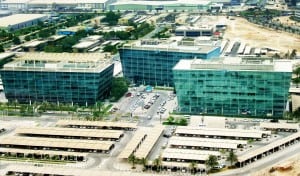
KUALA LUMPUR (Reuters) – On some of its international routes, ANA Holdings Inc is starting to offer an unusual type of snack – rice crackers that are certified halal, an Arabic word meaning “permissible”.
Such rice crackers will become less unusual as Japan’s biggest airline teams up with a Malaysian halal caterer to overhaul its menu and better meet the dietary requirements of Muslim travelers.
Until recently, Muslim travelers had either been humble pilgrims or jet-setting emirs. In the last few years, growing middle-class wealth has spawned a new genre of Muslim travelers who pursue leisurely escapes to atypical destinations like Japan, China and Thailand. The tallest hurdle for these new destinations is convincing Muslim tourists that the food they consume is halal. Pork and alcohol are haram, or “forbidden”.
Malaysia – a pioneer in certifying, producing and distributing halal food – has been busy marketing its halal expertise to non-Muslim countries. At stake is a $1 trillion halal food market that is forecast to expand markedly over the next few years.
Malaysia has decades of halal experience under its belt. Even Nestle SA , which sells halal products in mainly Muslim countries, gets its halal certification from Malaysia. It is only now that Malaysian halal companies are pressing the pedal on their global ambitions as they wake up to an expanding international market fuelled by middle class money in the Muslim world and rising demand from non-Muslim countries.
In January, Kuala Lumpur-listed Brahim’s Holdings Bhd , the world’s biggest in-flight halal meal provider, clinched a rare deal with ANA to help create halal Japanese cuisine on ANA flights. The airline is also planning to increase its supply of halal meals to third-party carriers.
The number of visitors to Japan from Southeast Asia, which has the world’s biggest Muslim population, have surged as the Japanese government relaxes visa requirements. The influx from Indonesia in particular more than doubled in the three years to 2013, data from the Japan National Tourism Organization shows.
A recent survey shows that Japan has exhibited the greatest effort among 60 travel destinations in making itself Muslim-friendly over the past year. From publishing a travel guide for Muslims to installing prayer rooms at some airports, Japan is fast working its way up an annual halal vacation poll by Singapore-based travel specialist Crescentrating.
The Japan Halal Association, one of two organizations in the country granting halal certification on behalf of Malaysia, also approved six applications in March. That compares with nine in 2012 and 2013 combined, a report by the government-backed Japan External Trade Organization shows.
The big increase in Muslim travelers highlights the urgency for non-Muslim countries to be more halal-compliant. Muslims are expected to spend $181 billion on travelling by 2018, up by almost a third from 2012, according to an estimate by U.S.-based research and advisory firm DinarStandard.
Nasreddine Hamadi, a PhD student returning to Dubai after a holiday in Malaysia, can’t wait to go to Japan.
“Malaysia is the furthest country I’ve been to so far,” said the 31-year-old neuroscience student as he counted the minutes to boarding time at Kuala Lumpur International Airport. “I’d really like to go to other countries like China and Japan.”
BRANDING, COMPETITION
Malaysia’s halal industry as a whole – from halal certification to production and distribution – accounts for 5 to 6 percent of gross domestic product, or 33 billion ringgit ($10.13 billion) currently, underlining the importance of the sector.
Whether this contribution to GDP can grow significantly and whether more Malaysian halal companies can achieve what Brahim’s Holdings has achieved in in-flight halal food services depends on consumer branding and outside competition.
“Brahim’s is a role model story for a halal company’s growth and expansion, but is this replicable?” said Rushdi Siddiqui, senior partner at DinarStandard.
The answer lies in being a competitive food and agriculture company first and making halal integrity almost a pre-requisite, Siddiqui told Reuters.
“Ultimately, consumer brands drive market recognition – again note Nestle’s recognition in this regard,” Siddiqui said, pointing to fast-food chain Marrybrown as an important name to represent Malaysia’s halal-led consumer brands.
Malaysian companies also need strong marketing strategies if they are to venture into the global arena, said Jamil Bidin, chief executive of Kuala Lumpur-based Halal Industry Development Corp.



